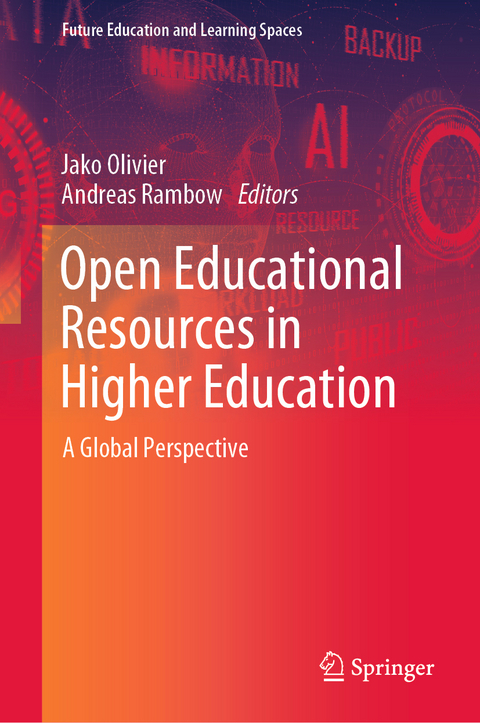
Open Educational Resources in Higher Education
Springer Verlag, Singapore
978-981-19-8589-8 (ISBN)
This book explores open educational resources and open education through research conducted on this topic globally. This book engages with intersections between open educational resources, social justice and equality, as well as policy in terms of open educational resources. Numerous examples of open praxis are also included, ranging from open educational resources courses to the affordances of artificial intelligence, data-driven learning, and open textbooks in this context. Furthermore, chapters range from providing a broad overview of open educational resources international and regional initiatives in Africa, to cases of work done in the United States, New Zealand, Israel, and Hong Kong. The role of Wikipedia and Wikidata is also prominent. Finally, this book includes unique contributions, focusing on open educational resources and feminist pedagogy, as well as disabled learners’ motivations for participating in Massive Open Online Courses (MOOCs). Academics and researchers workingin the field of open education and higher education in general will understand the importance of this work.
Jako Olivier is an Advisor: Higher Education at the Commonwealth of Learning, Canada. He is also an Adjunct Professor at the University of Nova Gorica, Slovenia where he lectures a course on Open Education Design as part of a Master’s in Leadership in Open Education. From 2018 to 2022 he was the holder of the UNESCO Chair in Multimodal Learning and Open Educational Resources and professor of Multimodal Learning in the Faculty of Education, North-West University, South Africa. Since 2021 he has acted as a mentor within the Open Education for a Better World (OE4BW) initiative. His research is focussed on open and distance learning, self-directed multimodal learning, open educational resources, multiliteracies, blended and e-learning in language classrooms, and multilingualism in education. He holds a rating from the South African National Research Foundation and was awarded the Education Association of South Africa’s Emerging Researcher Medal in 2018. He has published numerous articles and book chapters. Andreas Rambow is a senior educational adviser, consultant, and instructional designer with more than 27 years of leadership experience in higher education. He uses an evidence-based approach to provide consulting and advising services in a variety of areas in higher education to clients worldwide. These services include competence-based learning (CPL), problem-based learning (PBL), syllabus creation and virtual classroom design, best practices in blended learning, student engagement, training in learning management systems, faculty development, use of open educational resources, and executive education. He is also a Senior Faculty Member at Webster University, Leiden Campus, the Netherlands. He teaches courses in finance, accounting, economics, and general management to non-traditional students, senior managers, and executives. He has extensive experience working with students, learners, and executives from a distance using appropriate synchronous and asynchronous platform solutions for online teaching and learning. He has also been involved in the design of corporate training programs for the University of Maryland Global Campus, formerly the University of Maryland University College, and instrumental in the implementation of the online program between 2004 and 2011. The online program has won numerous awards in the United States, including the SLOAN award.
Chapter 1. OER: A catalyst for social justice and equality.- Chapter 2. OER: The promise, practice and problems.- Chapter 3. Developing supportive policies and strategies for their implementation: Student experience with real-world cases.- Chapter 4. Artificial intelligence-based techniques to assess and compare the quality of OER.- Chapter 5. Repositories of Open Textbooks for higher education: A worldwide overview.- Chapter 6. Reflections on remixing open access content into OER: A new paradigm for sustainable data-driven language learning systems design in higher education.- Chapter 7. OER: Guidelines in resource development for EAP.- Chapter 8. The collaborative picture book format as an OER for socialization, learning and assessment in higher education.- Chapter 9. Investigating disabled learners’ motivations of participating in MOOCs: A mixed methods research.- Chapter 10. The Wikipedia Education Program as OEP: Global stories.- Chapter 11. Who builds it, who benefits? Deepeningstudent and faculty knowledge about Wikipedia’s scholarly value.- Chapter 12. OERs for data literacy and knowledge equity: Integrating Wikidata into higher education.- Chapter 13. Legacy building through a “Teaching with Technology” open textbook project.- Chapter 14. Integrating OER praxis and feminist pedagogy in Gender, Women’s and Sexuality Studies.
| Erscheinungsdatum | 14.02.2023 |
|---|---|
| Reihe/Serie | Future Education and Learning Spaces |
| Zusatzinfo | 17 Illustrations, color; 21 Illustrations, black and white; VIII, 327 p. 38 illus., 17 illus. in color. |
| Verlagsort | Singapore |
| Sprache | englisch |
| Maße | 155 x 235 mm |
| Themenwelt | Schulbuch / Wörterbuch ► Unterrichtsvorbereitung ► Unterrichts-Handreichungen |
| Sozialwissenschaften ► Pädagogik ► Erwachsenenbildung | |
| Sozialwissenschaften ► Pädagogik ► Schulpädagogik / Grundschule | |
| Schlagworte | Assessment • Data-Driven Language Learning Systems Design • Feminist Pedagogy • OER Repositories • Open Education • Open Educational Resources (OER) • Open Pedagogy • Open Pedagogy and Policy Issues • Open Textbooks • Policies for Open Education • Social Justice • Wikis |
| ISBN-10 | 981-19-8589-8 / 9811985898 |
| ISBN-13 | 978-981-19-8589-8 / 9789811985898 |
| Zustand | Neuware |
| Informationen gemäß Produktsicherheitsverordnung (GPSR) | |
| Haben Sie eine Frage zum Produkt? |
aus dem Bereich


